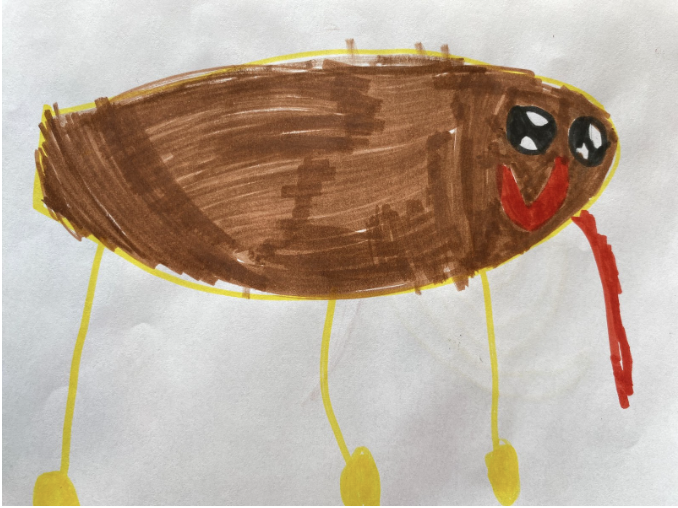Feeling afraid: Learning from children’s perspectives in scary times

Building on children’s perspectives on being afraid, this essay argues for harvesting our anger for action and the value of solidarity.
Scary times
The gutting of USAID, and the potential for new pandemics because of the eradication of vaccine programs, scares me. The illegal deportation (according to the US Supreme Court) of Kilmar Armando Abregop Garcia to a notorious El Salvadoran prison, and the threat to do the same to US citizens, scares me. The US government's abandonment of any effort to mitigate climate change, disregarding that the past ten years have been the hottest in human history, scares me. It is like we are living in the Harry Potter universe. Voldemort has returned and he and the Death Eaters have taken over the Ministry of Magic. These are scary times.
The late Carlina Rinaldi often observed how children have unique and insightful perspectives on the world and that we adults could benefit from paying more attention to children’s ideas. She wrote in an article titled The Child as Citizen:
It is necessary to know how to listen to [children], with respect, without prejudice, acknowledging their points of view, experiences, hypotheses, and knowledge. The pedagogy of listening has not only to do with school, it has to do with our humanity, all the more so in the time of epidemics and major climate change.
She added in the book In Dialogue with Reggio Emilia:
That is why the child is indispensable, an incredible resource. Because the child’s search for meaning in life pushes you, if you dialogue with him, into the universe because there are no limits. And that is also why there is hope for the future.
My friend and Remake co-editor Amos Blanton notes that young children tend to be less self-conscious than adults in speaking about emotions.
In a recent episode of the Everything Questions (the class podcast of the five-year-old Green Dragonflies class) I asked children about one particular emotion: being afraid. This essay shares their thoughts and how it is influencing my thinking about these scary times.
Planning for the Acorn Weevils episode of the Everything Questions podcast
Recently, Green Dragonfly teachers Maggie Oliver and Vaidehi Desai started the second season of their class podcast Everything Questions (available on Spotify). Around the same time, the Dragonflies selected the Acorn Weevil as our school’s Critter of the Month. As a capstone to our investigations about the Weevil, I decided to help the Dragonflies record a podcast episode about the Weevil.

As I planned for the episode, news of Rumeysa Ozturk’s abduction by government agents outside her Somerville, Massushetts apartment broke. Somerville is the next town over from where I live and work. Rumeysa is a graduate student in the department where I received my Ph.D. Her “crime” was writing an essay, in this case an op-ed in a student newspaper urging her university's administration to support a student union resolution. All very close to home. Very scary.
So I decided to ask the children about being afraid by talking about the Weevil, whose small size makes them seem vulnerable. I knew that the children’s ideas would not change policy. Nor did I expect that their thoughts would point the way to how I and others might respond to the push towards dictatorship. But I did suspect that they would talk about being afraid in different ways than the adults I am in dialogue with, and that we might learn from what they had to offer.
“Feel angry...feel alone”
I began the conversation about being afraid with a small group of Green Dragonflies by noting that Weevil grubs might be scared because they are little and do not have their families around. I asked what we could do to help them not feel scared. Anika suggested, “We could take care of them” and that the grub could look for its family. Sensible advice.
Jayce disagreed, arguing there was nothing the grub could do. He then reconsidered:
Jayce: It could be angry sometimes.
Ben: When you're scared, does it sometimes make you feel angry?
Jayce: Yeah.
Ben: You other guys, when you’re scared does that make you feel angry too? What do you guys do when you’re feeling scared?
Jayce: I just feel alone and nobody wanta to play with me.
Ben: That is not a great feeling. Feeling alone.
In subsequent conversations, I asked other children about Jayce’s description of feeling scared:
Ben: Jayce said when he feels scared he feels angry and alone. I’m wondering, when a friend feels afraid, what can you do to help them?
Caleb: You can say, “What’s wrong?” And then they’ll tell you. At school you can tell the teacher and they can talk.
And another group’s ideas:
Maverick: Give them a hug.
Ben: Excellent idea.
Ben: Linnea, what do you think?
Linnea: I don't know.
Ben: What do you do when you’re feeling a little scared?
Linnea: Tell someone.
Ben: Tell someone. Like a grown up or your family?
Linnea: Like sometimes when I'm lost in a store I tell someone that looks good. So I tell them and they help me find my grown up again.
Ben: That is an excellent strategy.
Linnea: And I give them my mom's phone number.
Ben: Mav, what do you do when you're scared?
Maverick: All I do is look for my grown ups. I try to be a little brave and look for my grown ups.
Yes to feeling angry; no to feeling alone
I encourage you to reflect on the children’s thinking about being scared. And I hadn’t thought of anger and fear being companion emotions. Jayce is insightful in linking the two. It makes sense, that the not-great feeling of being scared makes him feel angry. My takeaway from the children’s thinking: yes to feeling angry; no to feeling alone.
Anger is a natural and healthy reaction to what's going on in the US. The administration's intentional cruelty and their blatant disregard for the current and future wellbeing of the children I care for makes me angry. How could it be otherwise?
In some circles, anger has gone out of fashion. True, anger can be paralyzing, internalized, and turned on those closest to you. None of this is good. But recall the Clash lyrics from their 1979 album London Calling:
Let fury have the hour, anger can be power
Do you know that you can use it?
Do not let your anger control you, but let it fuel and energize your resistance. At the moment anger is an abundant resource. Let’s use it.
Feeling alone, on the other hand, is what aspiring dictators want us to feel. Feeling alone is disempowering. Resistance is a group activity.
Fortunately, I am at a school where I don't feel alone, where I know that my colleagues have my back, and we are making efforts to ensure folks feel connected. It starts with the general culture. For example, the forms my colleagues and I fill out at the start of the year not only include emergency contact information but what style of brownies we want for our birthdays (the director, Caitlin Malloy, follows these preferences with fidelity). Caitlin carefully monitors staff wellbeing, regularly checking in with everyone. This concern radiates out; each day I am aware of acts of kindness teachers offer to each other.
Since January, at our weekly staff meetings we have begun spending a solid chunk of time hearing from all the faculty about how they are doing. This is not straightforward as we work to make space to share worries while not becoming overwhelmed with despair.
Every group – families, workplace teams, clubs, neighbors – needs to find ways to make sure that no one feels alone. Here the children have good advice: check in, give hugs, and turn to trusted people. One more suggestion from Green Dragonfly Idris, who, in a conversation about community with his classmates, noted:
[You] need to be kind. You need to listen. You need to come outside into the community. People need to play in the community.
Yes, be kind, listen and come out and play.
Scary to post this
I published my first essay about teaching and learning in 1985. Since then I have written numerous articles and a number of books. Since we launched The Remake last October Amos and I (with some help from friends) posted 19 times.
This is the first time I have had any hesitation about sharing my writing. A year ago I would have scoffed at the suggestion that someone in the United States of America could get into trouble for freely expressing their perspective. I no longer scoff.
But every time we self-censor because of fear, it is a victory for Voldermort. That is not to say that those in more vulnerable positions should not be careful. They should. And those of us who are in positions of relative safety need to stand up. Like Maverick suggests, we need to be a little brave.
An Acorn Weevil joke
Near the end of the fifth Harry Potter book, Harry gives the Weasley twins, Fred and George, a large sum of money to set up a joke shop. Harry’s friend (and Fred and George’s brother) Ron questions the decision. Aware that the evil Voldemort is making a comeback and that his community is in for dark times, Harry responds that we are all going to need some good laughs.
With this in mind, let me share the final question and answer from the Dragonflies’s Everything Questions Weevil podcast:
Ben: My friend Dan who lives in Brooklyn, New York wants to know: are there any Acorn Weevil jokes?
Kai: Yep, there's one.
Ben: Go ahead.
Kai: If you had two Acorn Weevils which would you pick: the bigger or the smaller?
Ben: What do you guys think?
Josh: The smaller.
Kai: Correct.
Ben: Why is that correct Kai?
Kai: I forget the end.
Ben: Should I tell it?
Kai: Yeah.
Ben: You should always pick the lesser of two Weevils.
If you know someone who is scared, consider sharing this essay with them to start a conversation about constructive responses to the current political situation.
Thanks to Amy Rothschild, Mara Krechevsky, Missy Arellano, Amos Blanton and Caitlin Malloy for their feedback on this essay.
And some good news. At the time this essay was posted, Rumeysa Ozturk had been released and returned to her home in Somerville, Massachusetts.
